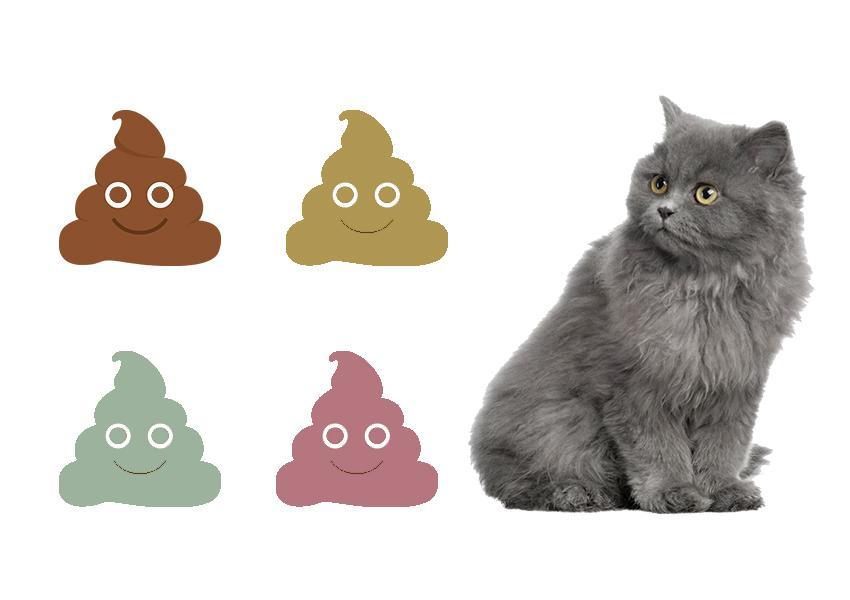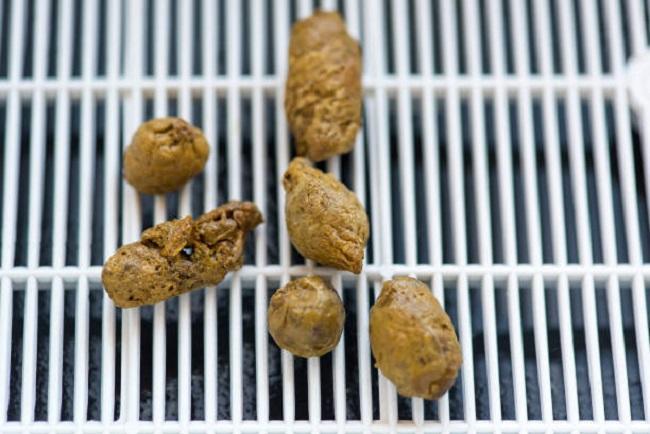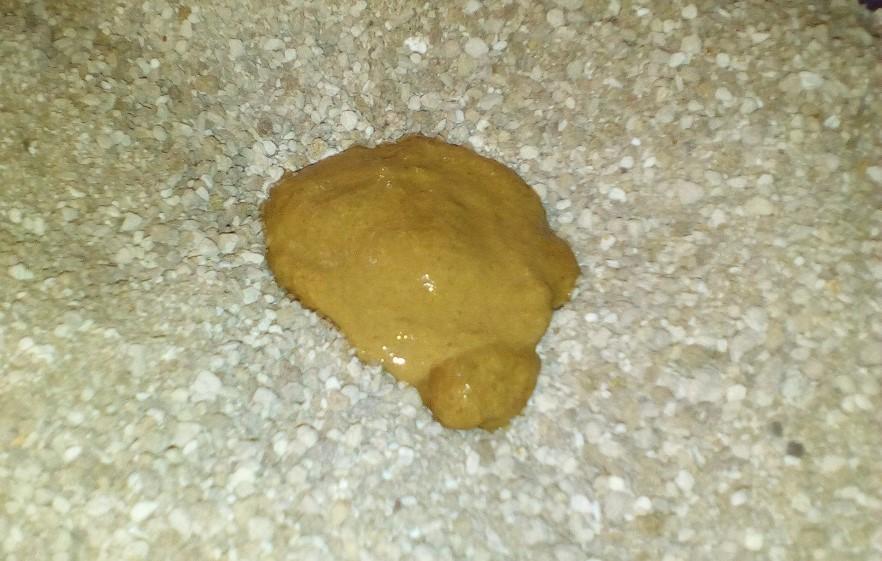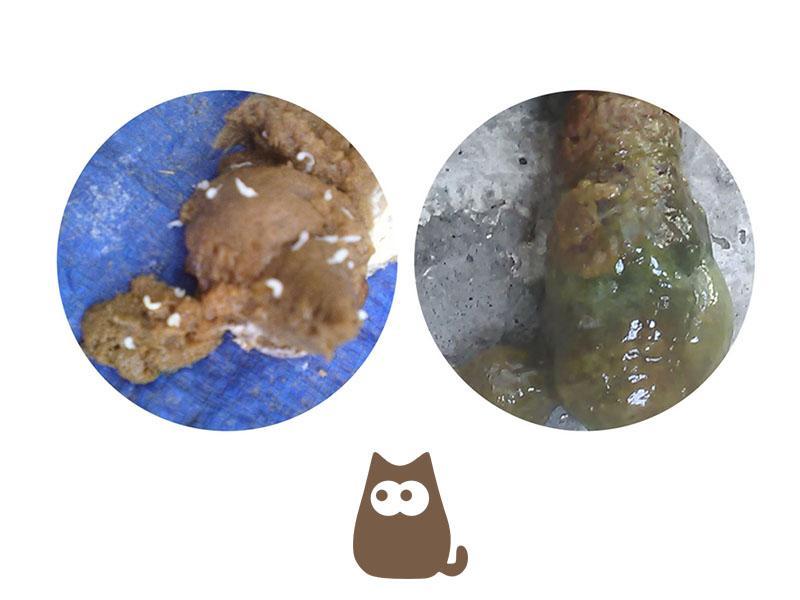Is My Cat’s Poop Normal? - Abnormal Cat Poop Chart



See files for Cats
Seeing abnormal cat poop is likely a sign of a health problem. While it is possible psychological issues can cause changes in your cat's stool, it is more likely to be a result of physical health issues which result in gastrointestinal problems. Changes in a cat's poop can be due to color, consistency, shape or even the presence of blood or other substances. You may see your cat's stool looks green or is much darker poop than normal. It may be more liquid or harder than usual. We can also see behavioral changes when our cat defecates which indicate your cat's poop isn't normal.
At AnimalWised, we help you determine is my cat's poop normal? We do so by providing an explanation of what normal cat stool should look like, as well as an abnormal cat poop chart with photos to help you determine if your cat has a problem.
What does normal cat poop look like?
Before we understand what abnormal cat poop looks like, we should provide a reference for normal cat poop. Generally speaking, cat feces must be consistent and compact, of a uniform color that can oscillate between several shades of brown, depending on the food they consume. When it comes to analyzing your cat’s poop and what it is trying to tell you, the first thing you should take a look at is whether there is a change in cat poop consistency or cat poop color.
If your cat's poop has a sticky peanut butter consistency, it is likely too soft. It needs to hold its shape, although being too hard is also a problem. We can tell the difference between healthy stools and diarrhea in cats as the latter will be practically liquid. Diarrhea in cats is a symptom of various health problems with varying degrees of severity. Below you can see a picture of healthy cat poop.
If your cat’s poop presents inconsistencies that don't stop after 24 hours, a veterinarian will need to establish both the diagnosis and treatment. This can often result in a change of diet, deworming and general administration of antiparasitic treatment or antibiotics.
For more, we recommend reading up on our home remedies for deworming my cat.

Diarrhea or loose stools in cats
Among the types of cat poop we have loose stools. These poop types could result from different problems, ranging from gastrointestinal conditions, feline parasites, dietary problems and even stress.
If one day your cat’s stool is softer than normal, there’s nothing to worry about. If, however, your cat has diarrhea for longer than one day, you will need to determine the cause. If it gets to the stage your cat's diarrhea is completely liquid, it means the problem is acute.
Does your cat have diarrhea and is vomiting at the same time? Generally, soft stools that indicate a digestive disorder will be accompanied by other digestive symptoms such as:
- Vomiting
- Poor coat quality
- Dehydration
- Anorexia
- Apathy
Learn more in our article on why cats have diarrhea and vomiting.
Liquid poop, diarrhea in cats or soft stools may also be caused by intestinal parasites in cats. This is more common in younger cats. Various intestinal parasites in cats can infest a kitten as their immune system is still developing. These parasites can also be passed on by an infested mother via breastfeeding or spread through a litter.
Sudden changes in feeding or inadequate diet can also disrupt a cat’s digestive function. In addition, soft stool in cats may indicate other pathologies such as liver problems in cats.
Either which way, a veterinarian will be the one who will perform an examination, run any appropriate tests, diagnose the issues and administer the appropriate treatment. Below you can see a picture of unhealthy diarrhea in cats.

Color of cat poop
As we have already mentioned, normal cat poop should be brown in color. You may notice your cat excretes green cat poop or even yellow cat poop. Different color cat poop will indicate different things. We provide an abnormal cat poop chart which shows the following:
- Dark cat poop: very dark brown or even blackish cat poop suggest the presence of digested blood. Since it is unlikely your cat will have eaten blood, it suggests a hemorrhage somewhere in the digestive system. These hemorrhages can occur as a result of gastrointestinal ulcers or lesions derived from a parasite infestation. If you notice that there is fresh blood in cat stool, these may have originated in the digestive system or in the anal area often due to injury. For more, we recommend reading our article where we cover everything you need to know about blood in cat feces.
- White cat poop: although rare in cats, a high consumption of bones can cause the feces to be expelled appearing both white and hard.
- Green cat poop: this coloration can be seen when the transit of food through the intestine occurs faster than normal. This is often caused by an alteration in the cat’s digestive system.
- Yellow cat poop: this can also intimate the cat's digestion is too fast. However, green or yellow poop can also be due to parasites, infections or other diseases which can result in changes to a cat's stool.
When a cat has darker poop than normal, it can be a sign of digested blood, but this is not always the case. It is possible your cat has eaten something else which has colored their poop differently. As long as these are not foods forbidden for cats, your feline should be fine. However, we do need to ensure we provide a balanced and nutritious diet.
In addition to offering your cat a proper high quality diet, abnormal stools require veterinary consultation. But what happens if your cat cannot poop? If this is the case, take a look at the causes and treatment of a cat not peeing or pooping.

Substances in the cat poop
Finally, within the different types of cat feces and what they mean, sometimes you may notice plant remains or other elements within your cat poop. This observation means that these elements were not able to be digested by the cat’s organism. In addition, it is common that we can observe feces such as the following:
- Cat stool with mucus: these stools also usually accompany a softer consistency than usual. This mucus can also often appear with blood. This is usually caused by the presence of infections or parasites in the digestive system.
- Kitten stool with worms: although this can happen with adult cats, cat poop with worms in ore common in kittens. This occurs when a kitten suffers from a parasite infestation. These parasites can be seen once the fees are expelled, similarly shaped to spaghetti or grains of rice, depending on the species. Do you need to deworm your kitten? Take a look at our article where we tell you everything you need to know about caring for a kitten.
Both of these above mentioned stool types, like all those previously mentioned, require veterinary consultation.
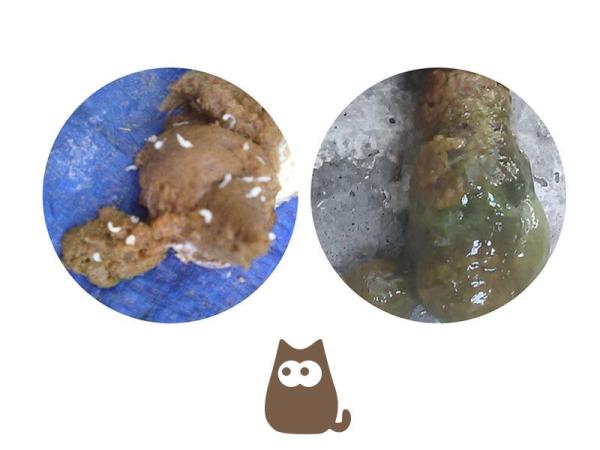
Is my kitten's poop normal?
While the abnormal cat poop chart we have provided explains inconsistencies in adult cat feces, it is important to know kitten poop can be different. This will vary according to different factors and it is common for kitten poop to change. However, symptoms of gastrointestinal problems such as diarrhea or blood in the cat's feces should never be ignored. The relative vulnerability of kittens means extra care needs to be taken.
While the previous types of abnormal cat poop still apply to kittens, it will help to know what normal kitten poop should look like:
- Color: although adult cat poop should be brown, it is normal for young kittens to have stools which are a little lighter in color, sometimes tan or a little yellow. This is especially the case when they haven't been weaned and are still mainly drinking milk.
- Consistency: also when the kitten is drinking milk, it is normal for the kitten to have softer stool. This can continue once they are weaned, but it should never be runny or have a diarrhea consistency.
- Smell: although it should not have an especially foul odor, it is possible kitten poop is a little more pungent than their adult relatives.
- Health: although kitten poop can be a little different than that of adult cats, it should still be healthy. There should not be the presence of blood, mucus, foam, parasite eggs or anything else which can indicate a health problem.
Finally, it is important to know that a kitten's first poop is very different than those that come after. The first stool of a kitten is called meconium. It is very dark and can even be a little green in color. It is also sticky and glossy looking, with an otherwise liquid consistency. This is because it comes from the nutrition the cat receives in utero. It may last for one or two more bowel movements, but it should turn to normal kitten poop soon after.
Learn more about the early development of cats with our article on weaning kittens.

This article is purely informative. AnimalWised does not have the authority to prescribe any veterinary treatment or create a diagnosis. We invite you to take your pet to the veterinarian if they are suffering from any condition or pain.
If you want to read similar articles to Is My Cat’s Poop Normal? - Abnormal Cat Poop Chart, we recommend you visit our Other health problems category.






 I have a 16-year-old cat with no parasites and was checked over by a veterinarian but could not find anything wrong with him. However, he has diarrhea. You can tell he has urgency and his back will hump up before he can get to the box.
I have a 16-year-old cat with no parasites and was checked over by a veterinarian but could not find anything wrong with him. However, he has diarrhea. You can tell he has urgency and his back will hump up before he can get to the box.

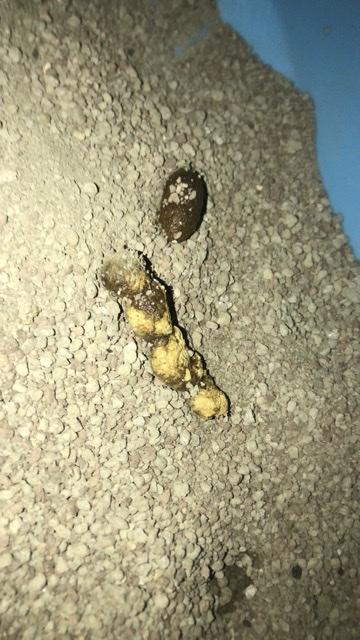 Why is she doing poop like this? Is there any problem??
Why is she doing poop like this? Is there any problem??

 My cat is licking his butt a lot. Can you tell my anything about his poop?
My cat is licking his butt a lot. Can you tell my anything about his poop?

 My ⁵ week kitten is pooping like this ..is it ok
My ⁵ week kitten is pooping like this ..is it ok


 My kitten is doing very runny yellow stinking poops.
My kitten is doing very runny yellow stinking poops.
